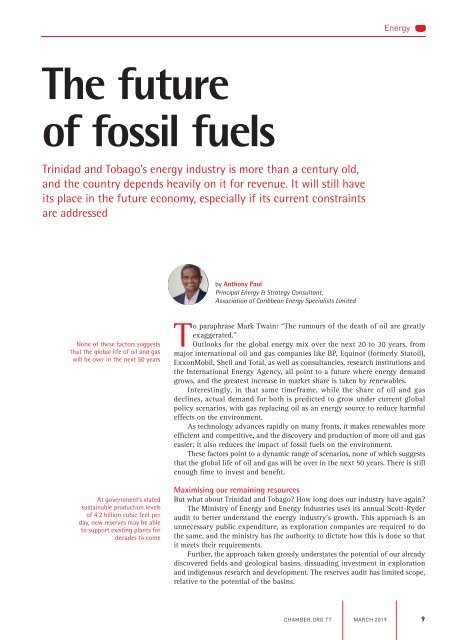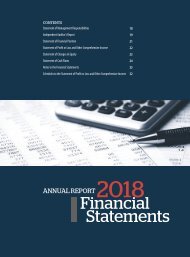Contact_Vol19No1_March2019_WEB full and final
You also want an ePaper? Increase the reach of your titles
YUMPU automatically turns print PDFs into web optimized ePapers that Google loves.
Energy<br />
The future<br />
of fossil fuels<br />
Trinidad <strong>and</strong> Tobago’s energy industry is more than a century old,<br />
<strong>and</strong> the country depends heavily on it for revenue. It will still have<br />
its place in the future economy, especially if its current constraints<br />
are addressed<br />
by Anthony Paul<br />
Principal Energy & Strategy Consultant,<br />
Association of Caribbean Energy Specialists Limited<br />
None of these factors suggests<br />
that the global life of oil <strong>and</strong> gas<br />
will be over in the next 50 years<br />
At government’s stated<br />
sustainable production levels<br />
of 4.2 billion cubic feet per<br />
day, new reserves may be able<br />
to support existing plants for<br />
decades to come<br />
To paraphrase Mark Twain: “The rumours of the death of oil are greatly<br />
exaggerated.”<br />
Outlooks for the global energy mix over the next 20 to 30 years, from<br />
major international oil <strong>and</strong> gas companies like BP, Equinor (formerly Statoil),<br />
ExxonMobil, Shell <strong>and</strong> Total, as well as consultancies, research institutions <strong>and</strong><br />
the International Energy Agency, all point to a future where energy dem<strong>and</strong><br />
grows, <strong>and</strong> the greatest increase in market share is taken by renewables.<br />
Interestingly, in that same timeframe, while the share of oil <strong>and</strong> gas<br />
declines, actual dem<strong>and</strong> for both is predicted to grow under current global<br />
policy scenarios, with gas replacing oil as an energy source to reduce harmful<br />
effects on the environment.<br />
As technology advances rapidly on many fronts, it makes renewables more<br />
efficient <strong>and</strong> competitive, <strong>and</strong> the discovery <strong>and</strong> production of more oil <strong>and</strong> gas<br />
easier; it also reduces the impact of fossil fuels on the environment.<br />
These factors point to a dynamic range of scenarios, none of which suggests<br />
that the global life of oil <strong>and</strong> gas will be over in the next 50 years. There is still<br />
enough time to invest <strong>and</strong> benefit.<br />
Maximising our remaining resources<br />
But what about Trinidad <strong>and</strong> Tobago? How long does our industry have again?<br />
The Ministry of Energy <strong>and</strong> Energy Industries uses its annual Scott-Ryder<br />
audit to better underst<strong>and</strong> the energy industry’s growth. This approach is an<br />
unnecessary public expenditure, as exploration companies are required to do<br />
the same, <strong>and</strong> the ministry has the authority to dictate how this is done so that<br />
it meets their requirements.<br />
Further, the approach taken grossly understates the potential of our already<br />
discovered fields <strong>and</strong> geological basins, dissuading investment in exploration<br />
<strong>and</strong> indigenous research <strong>and</strong> development. The reserves audit has limited scope,<br />
relative to the potential of the basins.<br />
CHAMBER.ORG.TT<br />
MARCH 2019 9
















